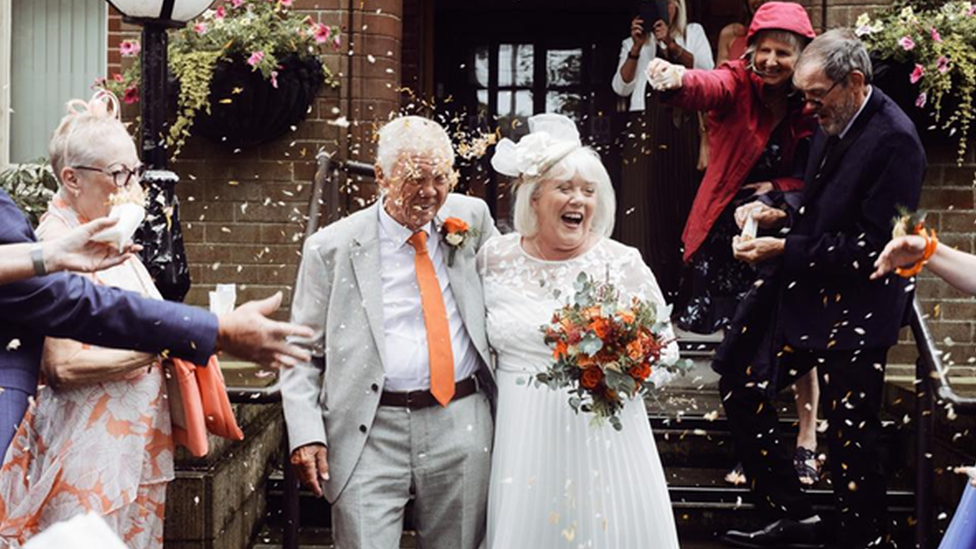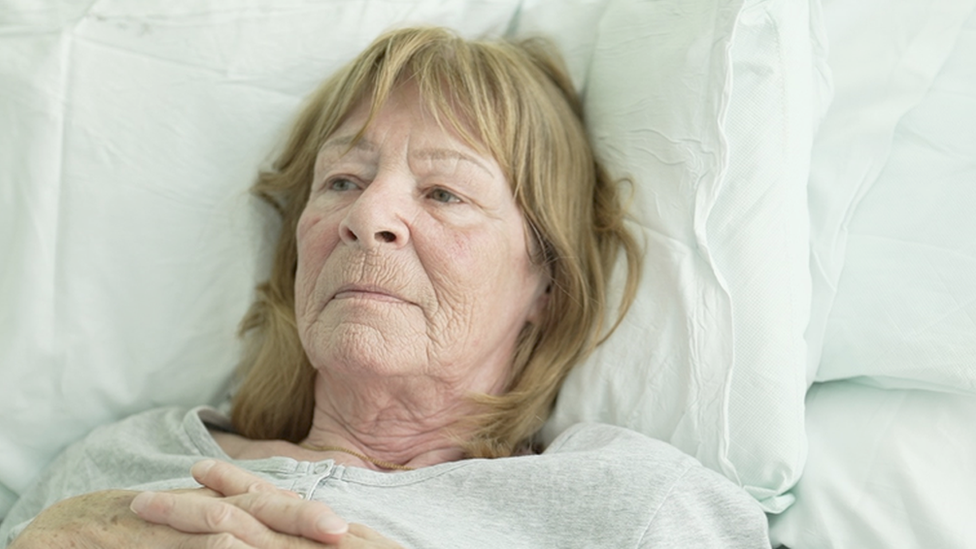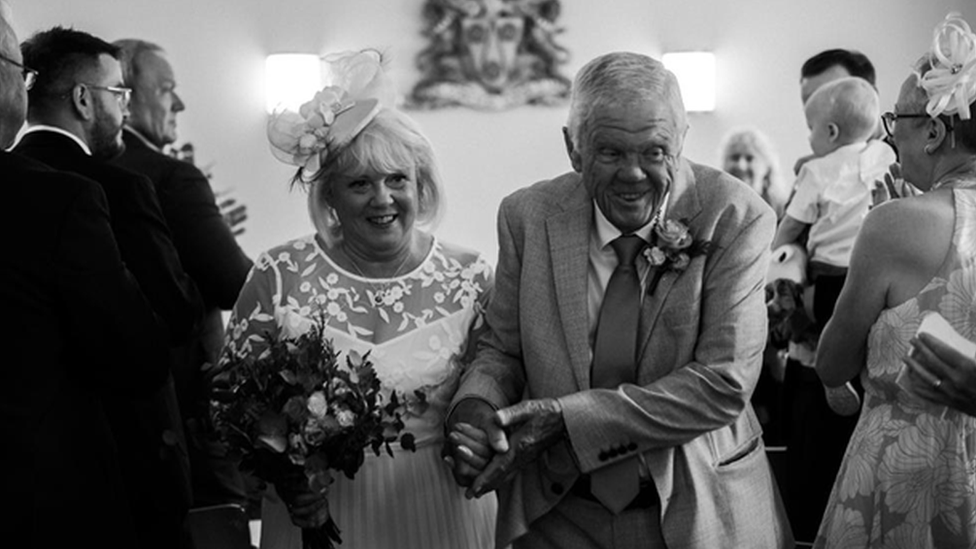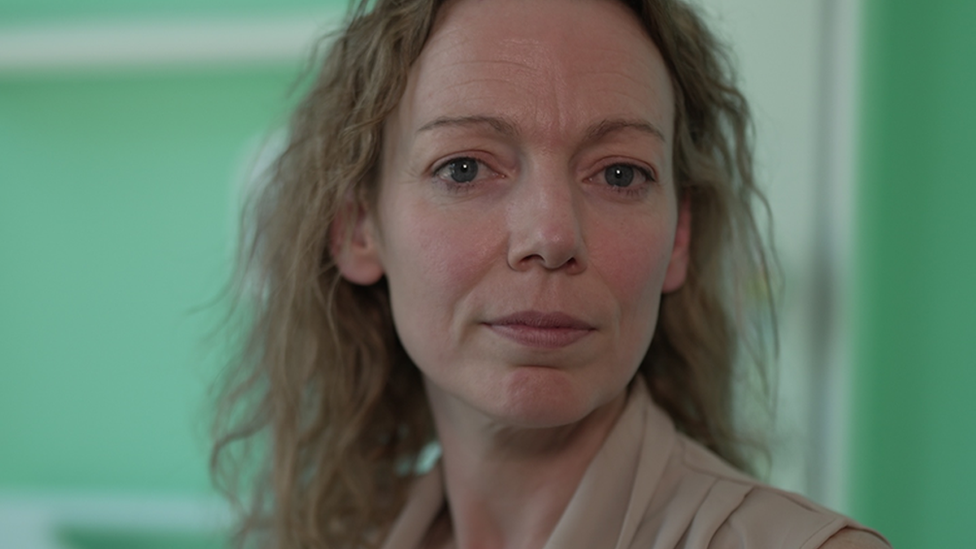Spinal cancer: Giving the gift of extra time to terminal patients
- Published

Wedding day for Robert and Lynda, three months after treatment at The Clatterbridge Cancer Centre
Spinal cancer, one of the most common secondary cancers, can lead to double incontinence, paralysis and death within 30 days. But a specialist service is extending patients' lives, giving people extra months for final holidays and proper goodbyes.
The BBC has been given exclusive access to the team at The Clatterbridge Cancer Centre in Liverpool and the patients they care for.
It has just gone 08:00 on a sunny Wednesday, and in a windowless boardroom, a team of emergency spinal cancer specialists are concerned.
Magnetic resonance imaging (MRI) scans of a woman's back are being projected on to a wall and they can see cancerous cells in her spine.
The patient needs radiotherapy treatment within 24 hours or risks paralysis and dying within weeks.
"We'll get an urgent ambulance to her this morning," the team coordinator says.

Yvonne Naylor has emergency diagnosis and treatment for spinal cancer within 24 hours
Within hours, the patient, Yvonne Naylor, arrives at The Clatterbridge Cancer Centre, where a team of health professionals specialise in the early detection and treatment of emergency spinal cancer.
The 73-year-old already knew she had lung cancer but came on to the team's radar after having back pain.
Urgent MRI scans at her local hospital, in Warrington, followed by computed tomography (CT) scans in Liverpool, confirmed cancerous cells had spread from her lung to her spine.
This is known as metastatic spinal-cord compression (MSCC), where the cancer presses on the nerves in the spine that carry messages between the brain and the rest of the body.
Without urgent action, it can cause serious disability, including permanent paralysis, incontinence and a drastically shortened life.
"This is an emergency but it [requires just] one radiation treatment and we can get that done today," consultant clinical oncologist Dr Clare Hart tells Yvonne.
What happens in the coming hours will probably dictate how the end of Yvonne's life will look.
Playing golf
"I have had a good innings, a good life," Yvonne tells BBC News from her hospital bed, as she waits for her treatment.
"I don't particularly want to leave all my loved ones but I'm OK with it. It's just everybody else that isn't. That's what hurts.
"I want to leave this planet comfortable and cared for and hopefully I will."
The BBC can reveal guidelines on how the NHS help people with MSCC will soon be updated - based partly on data collected by The Clatterbridge service, which has increased the average patient's survival rate by six months, while improving the quality of life.
Robert Glayzer, 75, was a patient in April.
What started as a complaint about back pain while playing golf quickly turned into an emergency.

Robert proposed to Lynda after receiving emergency treatment for spinal cancer
He was told to lie flat on his back in a hospital bed, unaware he may never sit up again.
"The original shock was horrendous. I'm not a softie but I had tears in my eyes," Robert says. "There's no easy way to tell somebody you've got cancer. It is a massive word.
"Straight away they said, 'We haven't got a cure but we will hold it back for quite a long time.'"
Further tests showed Robert had primary cancer of the oesophagus, along with MSCC.
Within hours, he was treated at The Clatterbridge and within days he was home and back on his feet, eager to make every extra minute count.
He got down on one knee and proposed to his partner of 14 years, Lynda, conscious he may not make it to 15.
Final word
Lynda, 68, says: "I had left him in hospital with big wide eyes after he had just been told he cannot be cured and I thought, 'What's more important in life? He wants me to be his wife, so let's do it.'"
The couple, who both lost their first spouses to cancer, married in July, surrounded by their family and friends.
"It's absolutely right to carry on enjoying what you're doing rather than going into your shell and saying, 'I'm doomed,'" Robert says.
"We've both decided to live our life every day as if it's our last.
"My final word would be do not ignore back pain, see your doctor."

Kate Parker developed the only specialist spinal-cancer team in the UK that runs seven days a week
The Clatterbridge model of early detection, rapid intervention and education should be emulated across all services in England and Wales, new guidance from the medical body NICE is expected to say when published.
Local GPs and hospitals across Cheshire and Merseyside have been trained by the 13-person team to spot early warning signs, such as bladder or bowel dysfunction, difficulty walking, numbness and back pain, and are aware of the importance of carrying out urgent MRI scans when red flags are detected. A hotline is available for advice and support.
If secondary cancer is found on the spine, patients are admitted to The Clatterbridge for further scans and radiotherapy treatment. This should all happen within 24 hours of diagnosis.
The seven-day service brings together a range of specialities, including oncology, physiotherapy, palliative care and radiology, to ensure decisions are made quickly.
Kate Parker, who developed the approach seven years ago, says: "As a radiographer, I was regularly seeing patients coming for treatment paralysed, incontinent and dead within 30 days.
"Now, patients get to spend time with their families and friends for many months instead of lying flat on their back in a hospital bed."
Itchy back
NICE is expected to say the cost of extending this service should be regained in the first few years.
MSCC is one of the most common secondary cancers and figures suggest it affects at least 4,000 people each year in England and Wales. Although, Kate says this is an underestimate, as last year her service alone treated 1,200 cases.
Hours after arriving on Merseyside, Yvonne has had her radiation treatment and, aside from an itchy back, is in good spirits.
Her quick turnaround treatment frees up valuable NHS beds, while early detection reduces the chances of her coming to an accident-and-emergency unit with complex symptoms. It also benefits Yvonne.
"Half of the pain is waiting for answers, waiting for results, waiting for appointments. It's been really quick here," she says.
The Clatterbridge team cannot alter Yvonne's final destination, but they have given her precious extra time with her family at home in Runcorn.
Yvonne is hopeful other patients will benefit from the care she has had.
"I'm sure they'll go on to save a lot of people," she says. "I couldn't be more grateful."